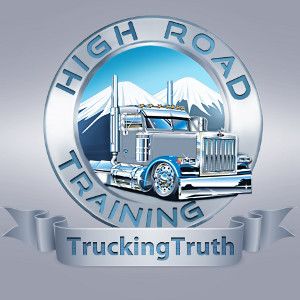

Follow along as we guide you through each of the company-sponsored training programs. You'll be able to:
Once you're finished, we'll generate a report showing all of your information so you can easily compare the programs.
Everything will be saved, so you can return here anytime to continue with your research without having to start over.
You will also have the option of sharing your reports, and viewing reports shared by other members of our community.
It's really simple and it's even kinda fun, so give it a try!




Note that you are required to obtain your CDL permit before arriving. If you do not have your permit already, you can study for that using our free online CDL training program.
Even though Knight does not require a passport or any additional endorsements, we very highly recommend you obtain your passport and pass all your endorsement exams before arriving.
Knight operates their schooling a bit differently than most other company sponsored programs. While they do not pay for your schooling, they offer simple 0% interest financing options and you will receive a salary starting on your first week of CDL training. Very few, if any other companies, will actually hire you before completing CDL school.
Knight Transportation is willing to cover nearly all up front costs and payroll deduct the costs once a student becomes a full-time driver. You will also begin receiving a salary of $300 per week during CDL school.
During the first week of training and orientation, Knight will pay for lunch.
Yes, but if you choose your own transportation and lodging, they will deduct $500 from the cost of CDL training.
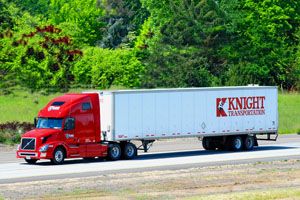
Yes, drivers may elect to pay for schooling up front and receive a 10% discount on some of the costs.
Total Expenses = $2,600 to $3,100
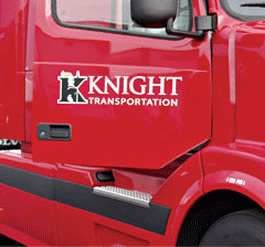
Knight will give you an interest free loan to cover the costs of CDL schooling. Once you are finished with CDL school and have become a full time driver, Knight will payroll deduct $50 from each paycheck until the entire cost of schooling is paid for. This takes about 18 months.
If you leave before CDL schooling has been paid in full, you may keep the interest free loan but will be required to continue payment until the loan has been repayed.
Trainees who pay fees in full prior to training will be provided a 10% discount of the Range and Road training fee.
Trainees who elect to finance the remained fees owed will agree to a weekly deduction of $50 from payroll until the balance due is paid in full. The deductions will not start until the Trainee has progressed to driving solo.
**Valid credit cards, money orders or bank checks will be accepted to pay for training. Cash or personal checks will not be accepted.
While employment is at-will, all deposits are non-refundable. Trainee Employees with un-satisfactory progress reports of knowledge and skills during the CDL training process may voluntarily withdraw from the course or may be involuntarily dismissed. Trainees must maintain an average of 80% on each skill until the completion of training.
Trainees must pass the state CDL skills test with an average score of 80% or better to obtain their CDL. If a trainee withdraws from the course or fails CDL testing attempts, the trainee may re-apply upon approval of Squire Training Management. Previous training costs or fees must be paid in full before re-admission to the CDL course is authorized. Trainees whose employment is involuntarily terminated will normally not be eligible to re-apply for the course.
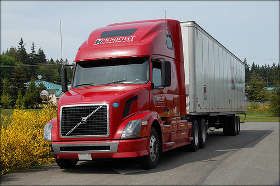
The tuition plan for Knight's CDL training program is very straight forward. They offer a unique program because you're already considered a paid employee even during CDL schooling. This is a great option for those who need some financial help in order to cover bills and living expenses during schooling.
With Knight, you get a paycheck your very first week. The pricing for schooling is cheaper than most private CDL schools. Combined with 0% interest financing, we believe the pricing for this program is very fair and actually a pretty good deal.
Range training consists of 40 hours of instruction during four week days. Classroom and secured range pad training at Squire's facility in Phoenix, AZ will allow trainees to learn basic knowledge and to practice off-road skills necessary to pass the CDL test. One qualified range instructor will be assigned to train and evaluate 3-4 trainees on the range. Trainees will learn and practice the following off-road skills during the first week of training:
After successful completion of range training, trainees will be assigned to train and drive on-the-job with a mentor for approximately two weeks. Trainees run loads between customer locations and will experience life on the road as a commercial driver. The mentor will continue to provide the trainee with the knowledge and skills necessary to pass the road portion of the CDL test. Trainees will learn and practice the following basic skills and develop the following basic knowledge while training on the road:
Trainees are evaluated daily on their progress during classroom, range, simulator and road training. Trainees are required to pass daily CDL training requirements to complete the state skills tests with 80% accuracy or better. State skills examinations include:
Trainees will use the same tractor and 53' trailer length they have been pulling on the road for two weeks to pass the State CDL test. Trainees with state test scores below 80% during the first attempt may try again upon approval of Squire Management.
CDL training lasts approximately 4 to 6 weeks and is personalized to meet the needs of individual students.
During the first week, students will receive instruction on the backing range. But students will also spend time with backing practice while on the road with their personal trainer.
During the first week, students may share a truck with 1 to 3 other students. After the first week, students are assigned their own trainer.
A minimum 40hrs of classroom time is required.
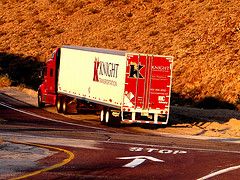
This is a very unique program because your CDL training is done out on the road. There are advantages and disadvantages to this. The main advantage is students will learn in a real world environment instead of a controlled training environment. Students will also receive personalized one on one instruction.
The disadvantage is students will only hear advice from one instructor, instead of hearing advice from multiple instructors like you would at most other schools. Real world training can also be a bit more stressful with fewer opportunities to practice certain maneuvers in controlled environments.
